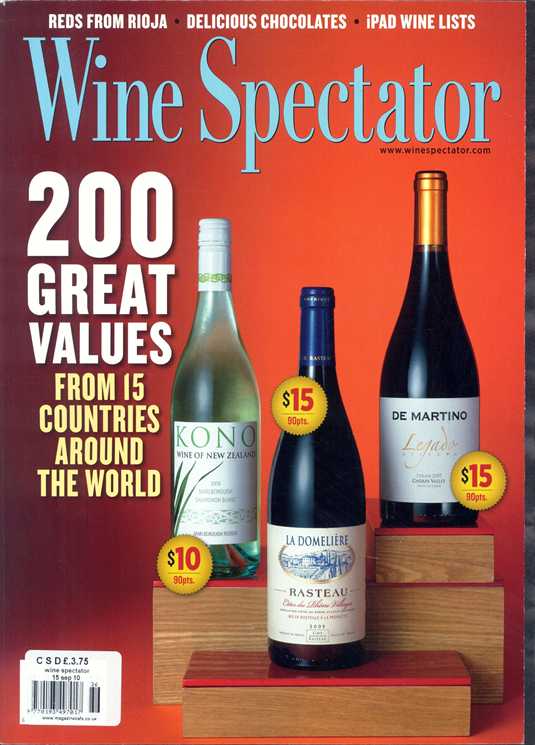One might be forgiven for thinking that if there was a large body of expert opinion about a wine consumers will be better informed and prices will stabilise at an agreed point. However recent research indicates that this may not be the case.
 A recent paper by Karl Storchmann (pictured), Alexander Mitterling and Aaron Lee of the American Association of Wine Economists has analysed the effect of expert opinion on wine prices by referring to a large sample of American wines reviewed in Wine Spectator magazine between 1984 and 2008. After poring over this large data set the economists reached three main conclusions.
A recent paper by Karl Storchmann (pictured), Alexander Mitterling and Aaron Lee of the American Association of Wine Economists has analysed the effect of expert opinion on wine prices by referring to a large sample of American wines reviewed in Wine Spectator magazine between 1984 and 2008. After poring over this large data set the economists reached three main conclusions.
The first is that the price-quality dispersion – the difference between the lowest and highest price a wine of a perceived quality fetches on the market – actually increases with the number of past reviews by wine critics.
Secondly, the price-quality dispersion increases if a winery has received very high scores for its wine in the past. This is particularly marked when the difference between the maximum scores and the average scores are large.
Thirdly, this effect is most pronounced on lower-quality than higher-quality wines. This finding leads to one of the paper’s more provocative arguments – that wineries’ lower-end wines may be over-priced. If a vineyard produces one high-quality wine that receives good reviews from critics, they can get away with charging a higher price for their lower-quality wines the following year.
This is no doubt because a superior quality wine with favourable reviews suggests the competence of the winery, improving its overall brand. This produces a ‘spillover’ effect whereby lower quality wines of the same winery will ‘bask in the glow’ of the brand’s flagship wine.
Are these findings as surprising as the authors claim? After all, one might expect the disparities between what prices consumers are willing to pay for wine would be fairly significant. Wine could be seen as an imperfect market where consumers are not particularly well-informed, with much scope for differing opinions as to the quality of the wine. Different people would then be willing to pay different prices for the same wine.
 Alternatively, one might expect that with the advent of the Internet consumers are far more able to make more informed buying decisions. The massive scope to research and discuss wines would in theory lead to some consensus over whether a wine is worthy of its price, leading to price matching quality with little significant variation. This would be particularly true as quality wines receive more and more good reviews over time, so that consumers acquire corroborating information.
Alternatively, one might expect that with the advent of the Internet consumers are far more able to make more informed buying decisions. The massive scope to research and discuss wines would in theory lead to some consensus over whether a wine is worthy of its price, leading to price matching quality with little significant variation. This would be particularly true as quality wines receive more and more good reviews over time, so that consumers acquire corroborating information.
To the contrary, this latest study suggests that the more a particular winery is reviewed, the more “noise” this introduces into the market, distorting the relationship between price and quality. The authors in fact suggest that this disruption caused by critical reviews may create demand for more critical opinion!
This is fascinating, made all the more so because it seems to be so counter-intuitive to “standard” economic models – and some would say common sense. Wine, as many people have been saying for many years, is different!
The publication is titled:
“THE DETRIMENTAL EFFECT OF EXPERT OPINION ON PRICEQUALITY DISPERSION: EVIDENCE FROM THE WINE MARKET”
By Karl Storchmann, Alexander Mitterling and Aaron Lee
ISSN 2166-9112 August 2012
